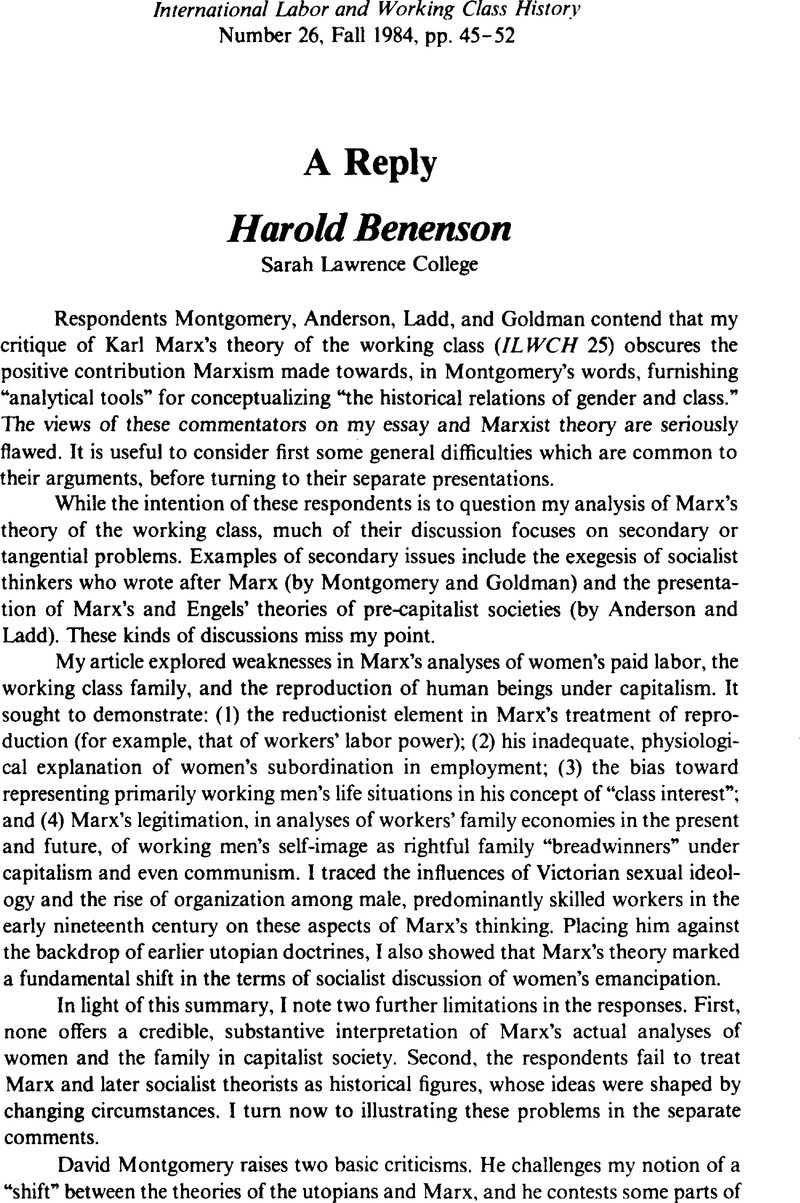No CrossRef data available.
Published online by Cambridge University Press: 16 December 2008

1. Johnson, Christopher H., Utopian Communism in France (Ithaca, NY: Cornell University Press, 1974), pp. 90, 92, 175Google Scholar; Marx, Karl and Engels, Frederick, “Manifesto of the Communist Party” in Collected Works 6 (New York: International Publishers, 1976), p. 513.Google Scholar
2. Evans, Richard J., The Feminists (London: Croom Helm, 1979), pp. 156–157Google Scholar; see also, Mies, Maria and Jayawardena, Kumari, Feminism in Europe (The Hague: Institute of Social Studies, 1981), pp. 129–130Google Scholar; Bebel, August, Woman in the Past. Present and Future, trans. Walther, H.B. Adams, (London: William Reeves, 1885), pp. 43–68, 178–232.Google Scholar
3. Honeycutt, Karen, “Clara Zetkin,” Columbia University, Ph.D. Dissertation, 1975, pp. 54–56Google Scholar; Vogel, Lisa, Marxism and the Oppression of Women (New Brunswick, NJ: Rutgers University Press, 1983), pp. 75, 98Google Scholar; Mies, and Jayawardena, , Feminism, p. 129.Google Scholar
4. Kautsky, Karl, Le Programme Socialiste (Paris: Marcel Riviere, 1910), pp. 38–39, 139–140Google Scholar; Steenson, Gary P., Karl Kautsky (Pittsburgh: University of Pittsburgh Press, 1978).Google Scholar
5. See my “Victorian Sexual Ideology and Marx's Theory of the Working Class,” ILWCH 25 (Spring 1984), pp. 15–16.Google Scholar
6. Marx, and Engels, , “Manifesto,” p. 501.Google Scholar
7. Freymond, Jacques, ed., La Premiere Internationale (Geneva: Librairie E. Droz, 1962), pp. 167–168Google Scholar; Collins, Henry and Abramsky, Chimen, Karl Marx and the British Labour Movement (London: Macmillan, 1965). pp. 119–120, 124Google Scholar; Thonnessen, Werner, The Emancipation of Women (London: Pluto Press, 1977), p. 33Google Scholar; Stekloff, G.M., History of the First International (New York: Russell and Russell, 1968), pp. 222–227Google Scholar; Marx, Karl, The First International and After, ed. Fernbach, David (New York: Vintage Books, 1974), pp. 16–17.Google Scholar
8. Marx, Karl, Capital Vol. 1 (New York: International Publishers, 1967), pp. 399, 464, 489–490, 696.Google Scholar
9. wrote, Engels, “To procure the necessities of life had always been the business of man,” The Origin of the Family, Private Property and the State (New York: International Publishers, 1972), p. 220.Google Scholar
10. See footnote 8, above.
11. See my “Victorian Sexual Ideology,” pp. 14–15; Engels, , The Origin, pp. 135, 231.Google Scholar
12. Sowerwine, Charles, Sisters or Citizens? (Cambridge: Cambridge University Press, 1982), pp. 21–32CrossRefGoogle Scholar; Evans, , The Feminists, pp. 153–159.Google Scholar